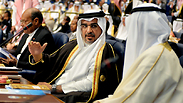
KUWAIT CITY - Qatar's ruler kicked off the opening session of the annual Arab League summit on Tuesday by criticizing fellow Arab leaders over their attitude to the Palestinians.
Sheik Tamim bin Hamad bin Khalifa Al-Thani reprimanded member states for not following through on a Qatari proposal made a year ago to set up a $1 billion fund to help the Arab residents of East Jerusalem, defiantly declaring that his tiny but super-rich nation will go ahead with the $250 million it has already pledged.
A resolution to create the fund was adopted by last year's Arab summit held in Qatar.
He also renewed calls for a small Arab summit to be held try to resolve differences between the militant Hamas group, which rules the Gaza Strip, and the Western-backed Fatah group in the West Bank. Qatar supports Hamas.
Meanwhile, in a final resolution drafted ahead of the summit, the League said it would flatly refuse to recognize Israel as a Jewish state. Israel has made the demand for recognition a condition of reaching a peace agreement with the Palestinians.
According to the draft of the final resolution, obtained by AFP, the Arab states declare their "absolute and categorical refusal to recognize Israel as a Jewish state". The resolution also "rejects all pressure to this effect on the Palestinian leadership", a likely reference to American efforts to keep the negotiations going after their April deadline.
The draft resolution will also call on Arab states to provide $100 million in financial aid to the Palestinian Authority every month.
Palestinian President Mahmoud Abbas, who last week held talks with President Barack Obama at the White House, met Monday with the foreign ministers of the League's 22 member states, to update them on the outcome of the talks, those present at the summit said.
Infighting and accusations
Tamim also lashed out at Iraq's Shiite-led government and Egyptian authorities, a move that is likely to add a new layer to tension in the region.
His criticism was not the only manifestation of inter-Arab differences surfacing in the Kuwait summit.
The representative of the Syrian opposition decried that he was not given Syria's seat, as was the case in last year's summit. Saudi Arabia's Crown Prince Salman bin Abdel-Aziz, standing in for King Abdullah, said he was puzzled by the move.
Without naming Iraqi Prime Minister Nouri al-Maliki, Tamim criticized what he said were attempts to sideline entire segments of that Arab nation, a reference to Iraq's Sunni Arab minority. His criticism of Iraq's government follow recent comments by al-Maliki in which he accused Qatar and Saudi Arabia of supporting Sunni militants in Iraq.
"It's about time for Iraq to emerge from the vicious circle of violence and differences. That cannot come about through the sidelining of entire society segments or accusing them of terrorism if they demand equality and inclusion," he said.
Vice President Khudeir al-Khuzaie, a Shiite, is representing Iraq in the summit.
Tamim also called on Egypt to start a "political dialogue," an implicit criticism of the crackdown there against the Muslim Brotherhood, the Islamist group that Qatar backs and of which Islamist President Mohammed Morsi is a member.
The military removed Morsi last July and there has been a massive crackdown against the Brotherhood, with the arrest of thousands and the killing of hundreds of its supporters. Morsi and leaders of the Brotherhood are in detention and some are in court on charges that carry the death penalty.
The criticism of Egypt is likely to further strain relations with Cairo at a time when Qatar's own relations with heavyweight Saudi Arabia, the United Arab Emirates and Bahrain - its partners in the Gulf Cooperation Council - are fraught with tension. Egypt and the three Arab nations have withdrawn their ambassadors from Qatar.















